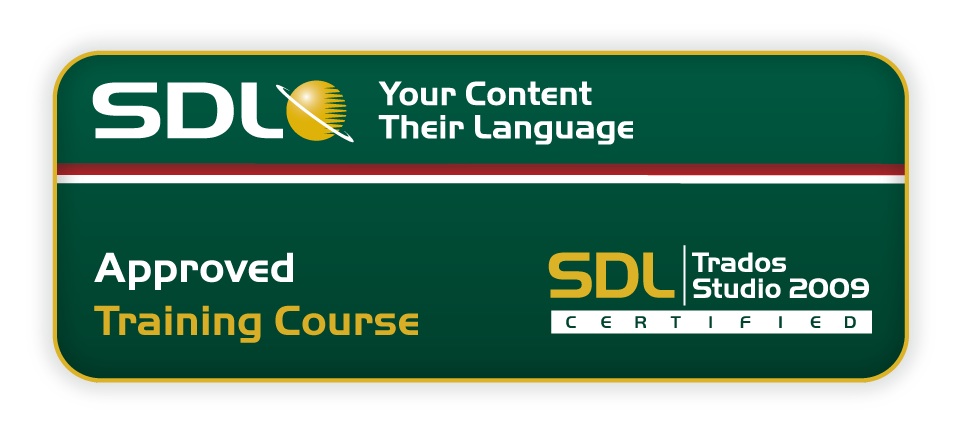Upgrading from SDL Trados 2007 to SDL Trados Studio™ 2011
Course summary
Upgrading from SDL Trados 2007 to SDL Trados Studio™ 2011 Learning Objectives: This course is designed to help you move from SDL Trados 2007 to SDL Trados Studio 2011 seamlessly and to get you started with SDL Trados Studio 2011 quickly, so that you can work productively with your solution from day one. The following topics are covered: - SDL Trados 2007 vs. SDL Trados Studio 2011 - overview - upgrading translation memories, termbases, and tag settings files - AutoSuggest™ dictionary generation - translating files in SDL Trados Studio 2011 - processing legacy files in SDL Trados Studio 2011 (TTX, ITD, bilingual MS Word files) - seamless integration of SDL Trados Studio 2011 users into SDL Trados 2007/SDLX 2007 based supply chains Target Audience: This course is designed for translators who want to move from SDL Trados 2007 / SDLX 2007 platforms to the new SDL Trados Studio 2011. This course is also relevant for project managers who need to how migrate their language resources (e.g. translation memories) to the new SDL Trados Studio 2011 platform. Prerequisites: This course has the following prerequisites: - familiarity with CAT technologies such as translation memories and termbases - knowledge of SDL Trados 2007 /SDLX 2007 - basic understanding of PCs, the Windows operating system and MS Word SDL TRADOS Certification: There is no exam for this course in particular, but it provides all the knowledge that you need to move straight to the SDL Trados 2011 Studio Part II (Intermediate) course. The SDL Trados™ Certification program enables individual translators and project managers to validate their knowledge and expertise in the use of SDL Trados products. Achieving SDL Trados Certification demonstrates that you are fully prepared to work with the world’s leading translation technology. Certification in SDL Trados Studio 2011 product can be achieved by taking the following web based exams: - SDL Trados Studio 2011 Part I (Getting Started) Level 1 exam - SDL Trados Studio 2011 Part II (Intermediate) Level 2 exam - SDL Trados Studio 2011 Part III (Advanced) Level 3 exam The exam questions are based on the topics covered in the corresponding SDL Trados Studio 2011 course e.g. attendance on the SDL Trados Studio 2011 Part II (Intermediate) course, followed by practical experience of the topics covered, will prepare attendees to take the SDL Trados Studio 2011 Level 2 exam. Each exam consists of 40 questions and lasts 40 minutes. Attendees take their exams by logging into their SDL My Account and selecting the My Certification area, where their exams and corresponding training manuals can be found. Attendees will be advised on completion of their exam whether they have passed or need to retake. Further Development: At the end of this course attendees will have covered all of the topics necessary to significantly increase translation speeds and productivity. - SDL Trados Studio 2011 Part II (Intermediate), which will teach you to go beyond the basics for more effective handling of translation projects - SDL Trados Studio 2011 Advanced, which will teach you to leverage advanced functionality to get the most out of the product - SDL MultiTerm 2011 course, which will teach you the key functionality of SDL MultiTerm 2011 See upcoming courses here. Further Information: For further information on any of our courses, training delivery options and course dates, the SDL TRADOS Certification programme or course fees please contact us Target audience This course is designed for translators who want to move from SDL Trados 2007 / SDLX 2007 platforms to the new SDL Trados Studio 2011. This course is also relevant for project managers who need to how migrate their language resources (e.g. translation memories) to the new SDL Trados Studio 2011 platform. Learning objectives This course is designed to help you move from SDL Trados 2007 to SDL Trados Studio 2011 seamlessly and to get you started with SDL Trados Studio 2011 quickly, so that you can work productively with your solution from day one. The following topics are covered: - SDL Trados 2007 vs. SDL Trados Studio 2011 - overview - upgrading translation memories, termbases, and tag settings files - AutoSuggest™ dictionary generation - translating files in SDL Trados Studio 2011 - processing legacy files in SDL Trados Studio 2011 (TTX, ITD, bilingual MS Word files) - seamless integration of SDL Trados Studio 2011 users into SDL Trados 2007/SDLX 2007 based supply chains Prerequisites This course has the following prerequisites: - familiarity with CAT technologies such as translation memories and termbases - knowledge of SDL Trados 2007 /SDLX 2007 - basic understanding of PCs, the Windows operating system and MS Word TOPICS COVERED DURING THE COURSE Click to expand Upgrading from SDL Trados 2007 to SDL Trados Studio™ 2011
Upgrading SDL Trados 2007 Translation Memories
TM Upgrades using bilingual files
Structured formats (XML)
AutoSuggest™ Dictionary generation
SDL PLC Registered Office: Globe House, Clivemont Road, Maidenhead, Berkshire, SL6 7DY, United Kingdom Tel: +44 (0)1628 410100 Fax: +44 (0)1628 410150. Registered In England and Wales, Number 2675207 www.sdl.com Version 3.0 August 2011 Copyright © 2011 SDL plc. All rights reserved Page 4 of 4 Upgrading SDL MultiTerm Termbases
SDL Trados Suite 2007 vs. SDL Trados Studio 2011
Registration and payment information (click to expand) Click to expand Click on the buy button on the right to purchase your seat Participation fee includes: • Access to training session with SDL Trados Certified Trainer. • SDL Trados Approved Training Manual & sample files for practice. • SDL Trados Certification Exams. Steps to take your training and certification: 1 - Register & Pay To register in this session please click on the "register and pay later" button on the right. Your status will be marked as "registered" and it will indicate only your interest in the training session. Status changes to registered and paid when payment is processed and informed to ProZ.com. To purchase your seat at this session please click on the "buy" button. Available slots are limited and will be assigned to registered and paid participants as soon as payment is reported. Early payment is advised in order to secure participation. Allow some time for payment processing if you are paying by wire transfer. There needs to be a minimum of 6 students to conduct this training session. If the minimum of paid students is not reached 72 hours before the session is to take place, you will be notified and asked to book your seat in an upcoming session without extra cost or transaction from your part. Participants should not delay in making payments to ensure classes are not canceled due to low enrollment. We suggest then you purchase your spot as soon as possible. If you have purchased training with SDL Trados or as part of a software + training offer you should redeem your credit by clicking on the "use credit" button on the right. More information about training credits is available here. After your payment is received, your status will be changed to “registered and paid” and your spot for the session will be secured. An invoice and receipt of payment will be sent to you for your records. 2 - Get your course manual and sample files After payment you will be given access to a restricted area of the site to download the courseware and sample files. You don't need to have gone through the manual and files before the training, and ideally should not have them open during the session. Your instructors will be sharing their screen and using the sample files. The manual and files are so that you may practice after the training and prepare to pass the certification exam. Some of the sample files will be proprietary SDL Trados files and can only be opened with an installed activated license of SDL Trados. 3 - Attend the training session 72 hours before the training session takes place, you will receive an invitation to join the session. Please, click the registration link or button provided in the invitation email to join the session at the announced time. Note: three hour online SDL Trados sessions are not recorded. 4 - Take your SDL Trados Certification exam SDL TRADOS Certification exams are delivered by SDL TRADOS. Certification exams will be available in your SDL My account approximately 10 working days after making a payment. Note that you must be registered and have an account at SDL to receive the certification exams. If you do not have an account with SDL, you can create one here: https://oos.sdl.com/asp/products/ssl/account/ Make sure you use the same email address associated with your ProZ.com account when creating your SDL account. If you have an account with a different email address, or if after 10 days you have not received the certification exams please contact SDL Product training at [email protected] indicating which training session you have taken along with the proper email address for your SDL account so that the certification exams can be updated. Please, read the SDL Certification Training Sessions FAQs for more information Software and system requirements (click to expand) Click to expand Software Virtual platform system requirements For PC-based Users: • Required: Windows® 7, Vista, XP or 2003 Server • Required: Internet Explorer® 7.0 or newer, Mozilla® Firefox® 3.0 or newer or Google™ Chrome™ 5.0 or newer (JavaScript™ and Java™ enabled) • Internet Connection Required: Cable modem, DSL, or better Internet connection • Recommended: Dual-core 2.4GHz CPU or faster with 2GB of RAM (recommended) For Mac®-based Users: • Required: Mac OS® X 10.5 – Leopard® or newer • Required: Safari™ 3.0 or newer, Firefox® 3.0 or newer or Google™ Chrome™ 5.0 or newer (JavaScript™ and Java™ enabled) • Internet Connection Required: Cable modem, DSL, or better Internet connection • Required: Intel processor (1GB of RAM or better recommended) To Use VoIP (microphone and speakers or headset): • Required: Fast Internet connection (384 kbps or more recommended) • Required: speakers or headset (USB headset recommended) • NOT required: Microphone - attendees can communicate with the trainer through incorporated chat. Recommendations • For the visual section of the training course, we recommend that you have a 64kbps link. This means using an ISDN line or Broadband. Wireless connection is NOT recommended. • For the audio section of the training course, we recommend that you have a headset or speakers. • We recommend that you log in 30 minutes in advance of the start time to prepare for the training course. Courses will be open half an hour before the start time. Please login before the start time to ensure that everything on your system is working correctly. Created by General discussions on this training Something went wrong... Dostęp do tego wątku jest zapewne zastrzeżony. Zaloguj się.
| Course registration To view pricing and payment options for this course, you must login to your ProZ.com account. Do you have any questions about ProZ.com training? Read the training FAQ » Still need help? Submit a support request » Would you like to share your thoughts about the ProZ.com training platform? Click here to discuss this feature in the forums » |
You have native languages that can be verified
You can request verification for native languages by completing a simple application that takes only a couple of minutes.
Review native language verification applications submitted by your peers. Reviewing applications can be fun and only takes a few minutes.
View applicationsYour current localization setting
polski
Close search



.png)